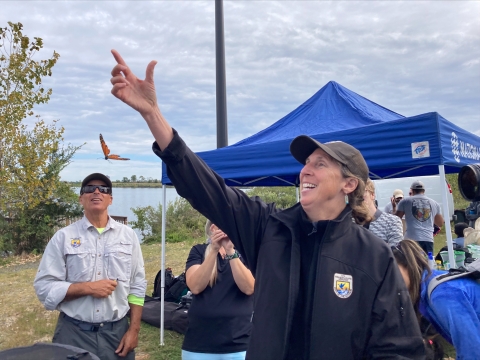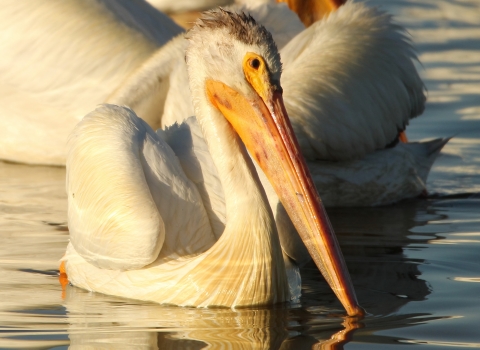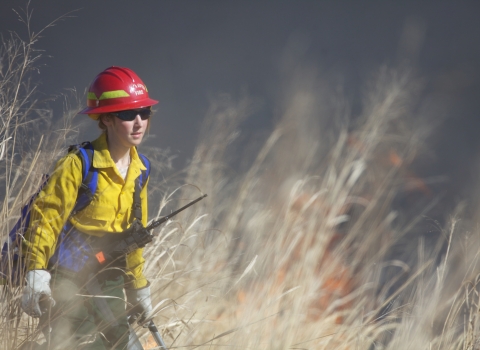For Immediate Release September 24, 2022
Contact:
Curtis Bennett National Aquarium, 410/576-1508
Katrina Jones Port of Baltimore, 410/370-6585
Lorraine Warnick Living Classrooms Foundation, 410/274-4398
Monese Delara The Links Inc. Harbor City Chapter, 443/756-7356
Baltimore, MD – In celebration of National Public Lands Day, families today explored the nation’s first urban wildlife refuge partnership through a variety of activities at Masonville Cove. The site, which includes 70 acres of water and 54 acres of restored wetlands and nature trails in the heart of Baltimore City, hosted kayaking, bird banding, monarch butterfly tagging, and tours of a dredge material containment facility. Masonville Cove is located at 1000 Frankfurst Avenue, Baltimore, MD 21226.
“Through our Urban National Wildlife Refuges and Partnerships, people make connections to wild places next door, public lands and the wonder of nature,” said Martha Williams, U.S. Fish and Wildlife Service Director. “With 80 percent of Americans living in cities, these programs and places encourage new generations to connect to the land, water and wildlife. Building connections to nature and wildlife also enhances the social and economic vitality of urban communities.”
The Service’s Urban Wildlife Conservation Program is creating a modern conservation legacy in and near cities. This community-centered model includes improving accessibility of green spaces, restoring and connecting wildlife habitat, improving resiliency to the effects of climate change climate change
Climate change includes both global warming driven by human-induced emissions of greenhouse gases and the resulting large-scale shifts in weather patterns. Though there have been previous periods of climatic change, since the mid-20th century humans have had an unprecedented impact on Earth's climate system and caused change on a global scale.
Learn more about climate change , and providing community recreation and education. The Masonville Cove urban wildlife refuge partnership collaborates with community-based organizations, government agencies and other institutions to connect local residents with nature and wildlife, enhancing the social and economic vitality of Baltimore communities. The partnership is also reaching out to other communities in key watersheds like Jones Falls, Gwynns Falls and the broader Patapsco River.
“We are very happy to host the ninth BioBlitz at Masonville Cove on National Public Lands Day,” said Maryland Port Administration-Port of Baltimore Executive Director William P. Doyle. “Masonville Cove is one of Maryland’s greatest environmental restoration stories. The Maryland Port Administration led a massive cleanup effort years ago that removed more than 60,000 tons of trash and debris dating back to the Great Baltimore Fire of 1904. Today, Masonville is the first U.S. Fish and Wildlife-designated Urban Wildlife Refuge Partnership with walking trails, incredible birdwatching opportunities, kayaking, and an environmental center visited by more than 2,000 students each year.”
Last year’s citizen scientist BioBlitzers recorded 139 different plant and animal species including rare bee species, white-tailed deer, Eastern cottontail rabbits, green frogs, painted turtles, red-eared sliders, American kestrels, osprey, American goldfinch, barn swallows and Canada geese, as well as a variety of fish, insects, spiders and mollusks, trees, flowers, grasses and fungi.
With the help of plant and animal experts, adults and children searched for, identified and recorded a diversity of wildlife during the annual BioBlitz hosted at the site by the National Aquarium. All observations are recorded on the iNaturalist, a free app.
“In celebrating National Public Lands Day and urban wildlife conservation, it is important to the National Aquarium that there are many unique activities like the BioBlitz that create opportunities for the community to connect to Masonville Cove in ways that are most meaningful, relevant and relatable to them,” said Curtis Bennett, Director of Equity & Community Engagement at the National Aquarium.
The Masonville Cove Environmental Education Center and Campus is nestled on the Middle Branch of the Patapsco River, within an industrial area adjacent to the nearby communities of Brooklyn, Curtis Bay and Cherry Hill. A containment facility was built just east of the Masonville Cove campus for the purpose of receiving dredged sediments from the annual maintenance of the Baltimore Harbor shipping channels. To mitigate impacts from that construction, the Maryland Department of Transportation (MDOT), Maryland Port Administration (MPA) restored the abandoned land on Masonville Cove and and built a near net-zero energy efficient environmental education center to host environmental education and community friendly programs. What began as restoration of the nearshore aquatic ecosystem and the previously contaminated parcel of land near Baltimore Harbor has grown into a nationally recognized federal/state/local Partnership connecting the city’s residents to the outdoors and growing a thriving habitat for hundreds of species of wildlife.
“The Port was proud to work with residents, community organizations and stakeholders to transform this brownfield, once overflowing with legacy contamination, into a beautiful green space that now welcomes thousands of students each year,” said Kristen Fidler, Director for Harbor Development at MDOT MPA. “By working with the Masonville Cove partners and the communities surrounding the Masonville containment facility, the campus is now truly a community resource, providing opportunities to experience nature, participate in free events and programs, and enjoy one of the harbor’s best waterfront views, a great place to see our working port in action.”
The Living Classrooms Foundation conducts environmental education activities throughout the year at the Masonville Cove Environmental Education Center as well as other places in Baltimore metro area. At this year’s celebration, they provided kayaking opportunities to those who want to explore the aquatic life of Masonville Cove.
“Living Classrooms Foundation strives to improve the lives and futures of children, youth and families as we serve communities in Baltimore and Washington, D.C., with holistic and transformative opportunities,” said Lorraine Andrews Warnick, Living Classrooms Foundation Director, Masonville Cove Environmental Education Campus. “At the Masonville Cove Campus we are able to offer safe, fun and hands-on learning experiences outside in nature, instilling a sense of lifelong stewardship. I often find myself telling students ‘Don’t grow up and get out of Baltimore to be successful. Stay here and do great things to make your city amazing. Explore. Discover. Engage.’”
Another goal of the partnership is to improve career opportunities for youth in conservation and environmental fields. Urban youth engagement has taken off with programs like WildSTEM, established by The Links Inc. and National Wildlife Federation, providing opportunities for young children to college students to become agents for positive change in their communities. The Harbor City (MD) Chapter of The Links, Inc. (Baltimore), with other partnership members, introduced Coppin State University students to careers and internships in the environmental sector.
“We are proud to support National Public Lands Day and urban wildlife conservation again this year in collaboration with our wonderful partners,” said Savonne L. Ferguson, President, Harbor City Chapter of The Links Inc. “We are pleased to play a role in helping the Baltimore community, especially communities of color, understand how critical it is to be good environmental stewards. We know that this work is long term and incremental, and we will remain committed to doing our part.”
“We are very happy to host the ninth BioBlitz at Masonville Cove on National Public Lands Day,” said Maryland Port Administration-Port of Baltimore Executive Director William P. Doyle. “Masonville Cove is one of Maryland’s greatest environmental restoration stories. The Maryland Port Administration led a massive cleanup effort years ago that removed more than 60,000 tons of trash and debris dating back to the Great Baltimore Fire of 1904. Today, Masonville is the first U.S. Fish and Wildlife-designated Urban Wildlife Refuge Partnership with walking trails, incredible birdwatching opportunities, kayaking, and an environmental center visited by more than 2,000 students each year.”




